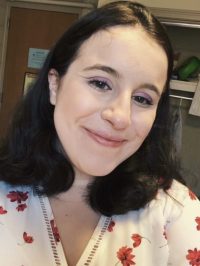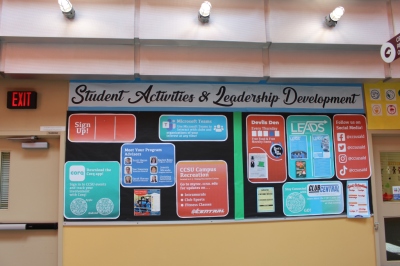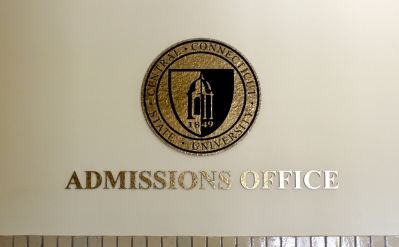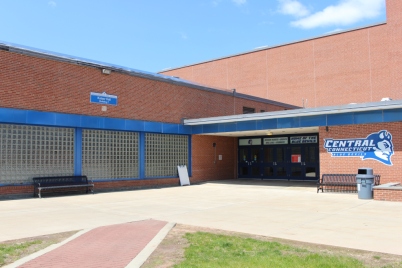Jayden Klaus, a freshman studying journalism at Central Connecticut State University, was a junior at Middletown High School when the world shut down in March 2020.

Klaus wasn’t very involved in school events; she’d created a “little bubble” for herself, and she planned to stay there. After some pestering from her mother, though, she begrudgingly joined the drama club her freshman year of high school as a stagehand.
She stuck with the club and worked her way up the ranks until her drama teacher hinted that she may see head of stage in her future. “I was like, ‘wow, that’s an incredible opportunity,’” she said.
The club had just finished their spring production when Klaus caught wind that the school could be closing down for “a couple of weeks” due to COVID-19. “I remember thinking to myself, ‘gosh, I hope that doesn’t happen because that’d be terrible.’ And then everything just went down the drain.”
The drama club held their weekly meetings on Zoom and continued to do so, even when Klaus and her classmates returned back to school. “We talked about like, maybe if things get better, we’ll be able to do the shows. But we never really got the opportunity to do so,” she said. “It never came.”
While her class had a prom and a proper graduation, Klaus said she was upset that she never got that chance to take over the head of stage position her senior year. She heard her classmates describe feelings of hopelessness and depression, but she didn’t relate. “I was just very irritated and disappointed,” she said.

David Nduati, a freshman and business major at CCSU, said that missing out on an in-person experience his junior year put him in a “slump.” He was slacking on his schoolwork and he missed socializing. “I didn’t get to see my friends until that September because of lockdown, so I was just by myself a lot,” Nduati said.
His class had planned to go on a trip to Washington D.C. just a few days after the school closed. He unpacked his bag and opened up his computer for months of online classes.
“It was really just the same thing day in, day out,” Nduati said.
A study measuring COVID-19-related stress among fourth graders to high school seniors by Northern Illinois University found that social isolation and missing events were two of the largest stressor categories reported by students.
According to Dr. Candice Wallace, a professor of social psychology at CCSU, it is normal for freshmen and sophomores to feel the effects of missing out. She said that as humans, our sense of belonging means feeling like we are part of a group.
“As soon as we start to feel we’re excluded for any reason, it sends off alarm bells for us that affect all kinds of things,” Wallace said. She said that social isolation and missing out can lead to loneliness, a lowered sense of belonging, and lowered self-esteem.
She has seen the effects of social isolation in her own students; they discussed suffering from anxiety, depression, and not feeling like themselves. While these factors have led to a loss of motivation in the classroom, she said she is more concerned by her students’ newfound lack of social skills.
“It’s that inability to like, see me and talk to me face-to-face, or see their classmates and sort of feed off of their classmates in class discussion and stuff like that,” she said. “That, to me, was more of a loss I felt as a professor than even the stuff related to the schoolwork.”
More specifically, she said her younger students have experienced difficulties making friends on campus. “They have not met other students here at CCSU as easily to say, ‘I have a good community of college friends that I met at college.’”

Alex Zupan, a sophomore studying sociology at CCSU, moved onto campus for her freshman year in the fall of 2020, when the majority of classes were virtual. She missed out on a proper orientation and struggled to meet her peers.
“My first semester was by far the worst,” Zupan said. “I literally didn’t know anybody.”
Zupan said that she felt secluded. She expected to make friends in classes and dorms, but social isolation guidelines kept them separated. She was already feeling disappointed after graduating from Haddam-Killingworth High School a few months prior; her class was unable to have a prom, a proper graduation ceremony, and other long-standing senior traditions at the school.
“If someone had told me that a virus was going to ruin my senior year and my first semester of college, I would have been like, ‘what are you talking about? Are you crazy?’ I would have literally thought they were nuts,” she said.
Zupan was not alone in feeling lonely. In a study by Harvard University, when asked which factors of the COVID-19 pandemic contributed to a decline in their mental health, 91% of freshmen said social isolation.
Dr. Michael Russo, the director of Counseling and Student Development at CCSU, said he has seen a “very significant increase” in students seeking out mental health services since returning back to campus.

The number of students who saw counselors in the fall 2021 semester was 4 percent higher than the entire 2020-2021 academic year. “Our intake blocks are booked up and we anticipate that’s going to continue through the end of the semester… we’ll probably see more students over the summer than we’ve ever seen before,” he said.
Students seek out counseling for a plethora of reasons, but Russo said that he has seen many freshmen and sophomores struggling to reintegrate back into larger populations after the social isolation they experienced. They missed out on their last year of high school, and then came to college where “things were just very different.”
“All of that impacts their level of anxiety and their level of depression,” Russo said. “That’s what we’ve really seen in the Counseling Center – very high levels of anxiety. Just feeling very overwhelmed and stressed and that, over time, impacts their level of depression.”
Sarah Horrax, the assistant director of Student Activities/Leadership Development at CCSU, said that she has also seen the impacts of social isolation on students now that they are running in-person events on campus.
“Students are talking to us about wanting to go to an event, but they’re like, ‘I don’t have a ton of friends. What do I do?’ And it’s like, ‘no, you just make friends.’ And they’re like, ‘I don’t remember how to make friends. Like, I literally don’t know how to talk to people anymore,’” she said.

Horrax said that SA/LD partnered with the Student Wellness Center during the campus shutdown via virtual events, and will continue to do so with in-person events. According to some club leaders, though, getting younger students involved during a pandemic is no easy task.
Alexandra Tudisca, a senior at CCSU, is the artistic director of the AcaBellas and listed as the president of a nonexistent A Cappella Society. The AcaBellas are the only members left of the “society” as two of the other groups were eliminated by COVID-19.
She said that it is “super hard” to recruit students to strengthen a community that was destroyed by the pandemic. “It definitely does not feel the same.”
Without tables at club fairs or shows around campus for exposure, Tudisca said that social media became her strongest tool for engaging incoming students. The AcaBellas were lucky to have online content like music videos and competition sets for interested students, but with billions of social media users, they had trouble finding freshmen’s accounts.
“They can’t see us on social media because they haven’t had the opportunity to find us,” Tudisca said. Club members decided to promote auditions on their own social media in hopes that freshmen would find them. They saw success in their marketing methods, but still struggled with recruitment as they had no place to rehearse.
The AcaBellas met on the fifth floor of the Welte Garage, masked and surrounded by space heaters. “Can you imagine trying to promote a group and saying, ‘yeah, we’ll be holding practice in the garage. See you at 5 p.m.’?”
Christy Jackson, a member of the Art & Design Club, said that the club also had issues recruiting last year as their meetings were virtual. The club is made up of only five consistent members as many students failed to attend the meetings regularly.
“A large part of college clubs appears to be social in nature, so it makes sense that online would not hold the same attention,” Jackson said. Recent high school graduates are not engaging in clubs like they used to.
According to CCSU’s Fall Headcount Enrollment, students are seemingly uninterested in college altogether. In the fall of 2020, CCSU saw 1,759 first-year students come to campus. By the fall of 2021, that number dropped nearly 12 percent to 1,549.
The dramatic decrease in enrollment is not a CCSU-specific issue. According to Inside Higher Ed, total enrollment across the nation “dropped by 2.7 percent in fall 2021 compared with fall 2020.”

Lawrence Hall, an undergraduate admissions counselor at CCSU, has felt the effects of both the national and institutional decline. “We’re still attempting to recover from that because there were some other side effects of the pandemic.”
Hall said the pandemic created new opportunities – educational or otherwise – in a simpler online format which pulled students away from CCSU. Additionally, Hall said that fear of COVID-19 itself and an objection to online learning kept enrollment numbers low.
Still, Admissions pushed on with recruitment. They attended online college fairs, virtual open houses, and implemented an outreach program in New York and New Jersey that they’d planned pre-pandemic. Hall said that more high schools began opening their door to admission recruiters and gave them access to students earlier on. Despite the reported decline, he said that CCSU is seeing the number of students coming back thanks to alternative approaches.
Thomas Pincince, the director of Athletics at CCSU, said the department saw no considerable decrease in the number of student athletes or their playing abilities. High school and college athletes continued to practice unofficially, but the pause was upsetting nonetheless.
“I think what they did miss out on was why most people play high school sports: it’s just to be around the team and your friends and the camaraderie that comes with it,” Pincince said.

The Athletics Department was especially hands-on during the campus shutdown; they did daily check-ins, made sure counseling services were available to them, and tried to answer questions that they “didn’t really have answers to.”
“We were trying to operate in a world that nobody had ever operated in before and it was really difficult,” Pincince said.
As COVID-19 restrictions have gradually lessened at CCSU, athletes are back with their teams and the school is coming back to life. Numerous campus officials said that they have plans to re-engage students and pull freshmen and sophomores out from their social isolation bubbles.
Russo and the Counseling Center are hiring a peer outreach worker to promote new services, particularly to freshmen during orientation. Dr. Tully, the interim vice president of Student Affairs, is working with other departments to create programs like the First-Year Experience course, which will support freshmen and connect them to the campus. Horrax and SA/LD are going to prioritize wellness and mental health programming on campus. Hall and Admissions are committed to a new four-year scholarship and financial aid modeling package.
As for freshmen and sophomores, they are finally getting a taste of typical campus life. Nduati lives on campus and joined the African Student Organization and the Black Student Union. He’s enjoyed meeting new friends with similar interests. Now in her second year living at CCSU, Zupan attended the 2021 spring concert and homecoming. She said she’s glad that CCSU is getting closer to normality each day. Klaus keeps in touch with friends from high school, and this year, the drama club put on proper shows. Klaus said she is happy for the now-seniors, but can’t help but wish she was able to do the same.
She has also enjoyed her time living on campus, but it has come with similar disappointments; she was supposed to go on a trip to France with the Journalism Department at the end of the semester, but it was recently canceled due to the rising number of COVID-19 infections overseas. “I was very excited for the opportunity because for years, my mom and I had talked about how I should do a course abroad,” she said.
Klaus was planning for her mom to meet her in Paris at a cafe for lunch. “It was legitimately crushing to learn we weren’t going,” she said. “I had hoped for quite a long time that we were still going to be able to go.”
She is hopeful that she’ll have the chance to travel abroad someday, but the setback still feels all too familiar.
This article was Sophia Muce’s journalism capstone for 2022. She also created a complimentary blog, CT Student Mental Health News, for JRN 385 Social Media and Mobile Journalism.

